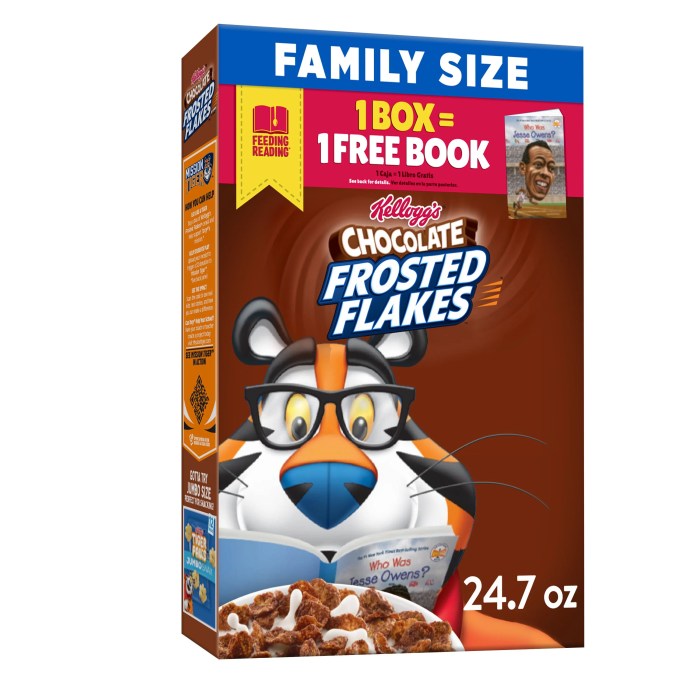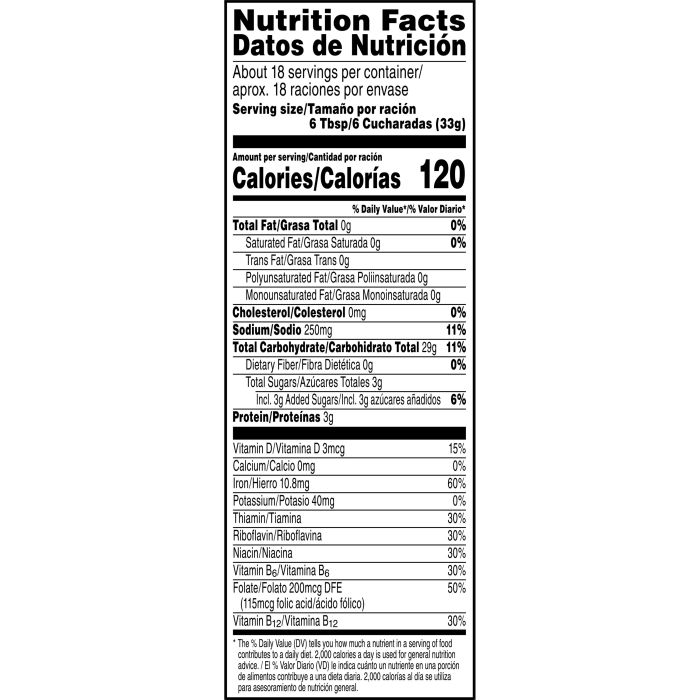Impact of Frosted Flakes on Health: Cereal Frosted Flakes Nutrition Facts

Cereal frosted flakes nutrition facts – Let’s be real, Frosted Flakes are delicious. That sugary, crunchy goodness is a childhood staple for many, but let’s dive into the impact of regularly enjoying this iconic breakfast cereal on your overall health. It’s not all Tony the Tiger roars and “They’re g-r-reat!”
Blood Sugar Levels and Frosted Flakes
The high sugar content in Frosted Flakes significantly impacts blood sugar levels. A serving typically contains a substantial amount of added sugar, leading to a rapid spike in blood glucose. This can be particularly problematic for individuals with diabetes or those at risk of developing the condition. The body responds to this sugar rush by releasing insulin, which can lead to subsequent crashes and cravings.
Think of it like a rollercoaster – a thrilling ascent followed by a dizzying drop. Consistent consumption of high-sugar foods like Frosted Flakes can contribute to insulin resistance, a precursor to type 2 diabetes. Managing blood sugar levels requires a balanced diet with controlled sugar intake, emphasizing whole grains, fruits, and vegetables.
Fiber and Digestive Health in Frosted Flakes
While Frosted Flakes do contain some fiber, it’s not a significant source compared to whole-grain cereals. The fiber present contributes minimally to digestive health, helping with regularity and potentially reducing the risk of constipation. However, the benefits are overshadowed by the high sugar content and the lack of other essential nutrients found in more nutritious breakfast options. To improve digestive health, consider incorporating foods rich in soluble and insoluble fiber, such as fruits, vegetables, and whole grains, into your diet.
While Frosted Flakes offer a quick, albeit sugary, breakfast, a comparative nutritional analysis reveals stark differences. For a heartier, potentially more balanced option, consider checking the panera cheddar broccoli soup nutrition facts before making your choice. Ultimately, the nutritional value of Frosted Flakes pales in comparison to the soup’s higher fiber and vegetable content, highlighting the importance of diverse dietary choices.
Think of fiber as the unsung hero of your gut – it keeps things moving smoothly.
Impact of High Sugar Content on Overall Health
The high sugar content in Frosted Flakes contributes to several potential health concerns beyond blood sugar issues. Excessive sugar intake is linked to weight gain, increased risk of heart disease, tooth decay, and even certain types of cancer. The empty calories provided by the sugar in Frosted Flakes offer little nutritional value, leaving you feeling less satisfied and potentially leading to overconsumption of calories throughout the day.
Remember that sugary cereals are often marketed towards children, leading to the development of a preference for sweet foods that can carry over into adulthood, impacting long-term health outcomes. A balanced diet, limiting added sugars, and regular physical activity are crucial for maintaining overall well-being.
Ingredient Analysis

Let’s break down the Frosted Flakes ingredient list like a detective solving a sugary mystery. Understanding what’s in your bowl is key to knowing how it impacts your body, so let’s dive in! We’ll explore the main ingredients, categorize them, and talk about their potential effects on your health. Think of this as your nutritional cheat sheet for that Saturday morning bowl of sugary goodness.
The ingredient list can vary slightly depending on the specific production batch, but here’s a general overview of the main components and their roles in creating those iconic, frosted flakes:
Grains
The foundation of Frosted Flakes is, of course, grain. Specifically, it’s corn. This provides the base structure of the cereal, contributing carbohydrates for energy. However, it’s important to note that the processing of the corn into flakes significantly alters its nutritional profile compared to whole corn.
- Corn: Provides carbohydrates, a source of energy, but often lacks significant fiber in its processed form.
Sugars
This is where things get interesting – and sweet! Sugar is a major component of Frosted Flakes, contributing to its flavor and texture. Excessive sugar intake is linked to various health concerns, so moderation is key.
- Sugar: Provides sweetness and flavor, but high consumption is associated with weight gain, increased risk of type 2 diabetes, and tooth decay. Think of it like this: a little sugar is okay, but a whole bowlful might leave you feeling sluggish and with a sugar crash later.
- High Fructose Corn Syrup: Another type of sugar that adds to the sweetness. Similar concerns about excessive consumption apply as with regular sugar.
Vitamins and Minerals
While Frosted Flakes are primarily known for their sugary deliciousness, manufacturers often add vitamins and minerals to boost the nutritional profile. These are typically added in fortified form.
- Vitamins (e.g., B vitamins): Contribute to various metabolic processes, energy production, and nerve function. However, the amounts are often relatively small compared to those found in whole, unprocessed foods.
- Minerals (e.g., Iron): Important for red blood cell production and oxygen transport. Again, the quantities are generally lower than in nutrient-rich foods.
Other Ingredients, Cereal frosted flakes nutrition facts
Beyond the main categories, there are other ingredients that play a role in texture, flavor, and preservation.
- Salt: Enhances flavor, but excessive sodium intake can contribute to high blood pressure.
- Artificial Colors and Flavors: These enhance the visual appeal and taste, but some individuals may have sensitivities or concerns about their long-term health effects.
- Maltodextrin: A carbohydrate used as a filler and to improve texture.
FAQ Section
Are Frosted Flakes suitable for children?
Frosted Flakes can be part of a child’s diet, but portion control is crucial due to the high sugar content. Pair it with fruits and dairy for a more balanced meal.
Are there gluten-free alternatives to Frosted Flakes?
Many brands offer gluten-free breakfast cereals with similar textures and sweetness levels. Check product labels carefully for confirmation.
Can I eat Frosted Flakes every day?
Daily consumption isn’t recommended due to the high sugar content. Vary your breakfast choices for a more balanced nutritional intake.
How does Frosted Flakes compare to whole-grain cereals?
Whole-grain cereals generally offer higher fiber and lower sugar content, leading to better digestive health and sustained energy.
